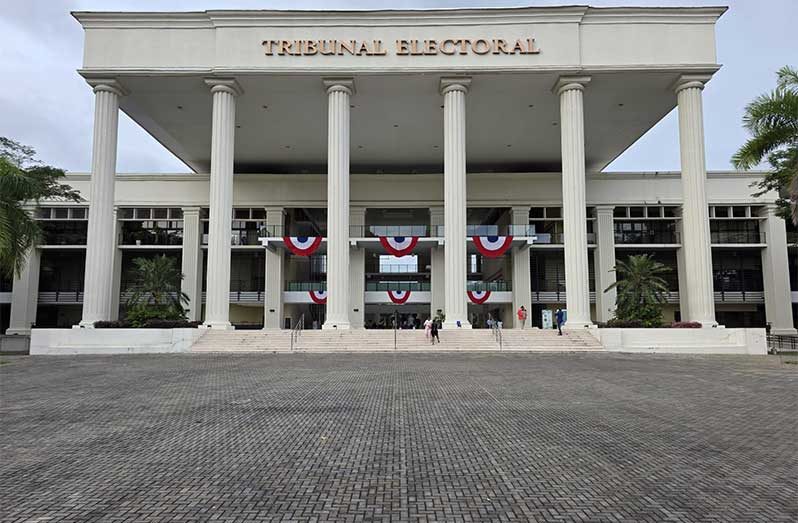RECENTLY, I had the privilege of joining several distinguished Guyanese journalists on a study visit to an institution that stands as a beacon of robust democracy in the Americas: Panama’s Electoral Tribunal. While the Tribunal often surfaces in headlines, especially during Panama’s tumultuous 2024 presidential elections, nothing compares to witnessing the institution’s daily operations and physical presence firsthand.
For Guyanese observers passionate about electoral reform and institutional integrity, the experience was awe-inspiring. Every journalist in our cohort echoed a single sentiment: this is exactly the kind of institution Guyana should aspire to create if it hopes to safeguard and strengthen democracy for future generations.
Our visit was organised by the International Institute for Democracy and Electoral Assistance (International IDEA), a respected global body supported by the European Union, which connects journalists, election officials, and civil society actors from across the hemisphere in a bid to share best practices in democratic governance. From the outset, the transparency and openness of the Tribunal were striking, and its staff displayed both pride and humility in welcoming us to their headquarters.
The Tribunal’s headquarters is an architectural marvel that was inaugurated in November 2013 during the presidency of Ricardo Martinelli. It is strategically located on 3.2 hectares of well-manicured, publicly accessible grounds in Panama City. The main building, rising to five stories, is a physical embodiment of the transparency and accessibility the Tribunal strives to provide to citizens. Visitors are immediately struck by the sense of grandeur and civic purpose conveyed by the soaring columns and well-lit communal spaces. It is not merely an office; it is, arguably, the most impressive institutional building in Panama and a conscious signal of the Tribunal’s constitutional importance.
The Electoral Tribunal, established under Article 142 of Panama’s Constitution, holds sweeping powers as an autonomous, independent institution with its own budget. The Tribunal comprises three magistrates, each appointed by a different branch of government (the Executive, Legislative, and Supreme Court), to serve staggered ten-year terms. This unique arrangement is a constitutional safeguard to protect its independence and minimise political interference.
With a full-time staff of about 3,500, the Tribunal’s purview extends across the entire civic landscape. Beyond managing national and municipal elections, it supervises the civil registry, producing official identity cards, birth and marriage certificates, death records, and processing adoptions. In 2025 alone, the Tribunal’s state-of-the-art printing facilities produced over half a million polycarbonate ID cards, each embedded with QR codes for security and rapid identification, making them virtually impossible to forge.
The Tribunal’s role as a democratic safeguard is further reinforced by its Digital Media Centre, a 24/7 nerve centre staffed by 80 communications experts. This unit monitors the online activities of political parties and candidates, fights disinformation, and rapidly counters fake news that could distort public discourse. Seven official social media accounts disseminate verified information to the public and rebalance the digital landscape during heated campaign seasons. Meanwhile, an in-house media team supplies original content to radio, print, and online news outlets nationwide, ensuring a constant flow of accurate electoral information.
Civil documentation is managed on a massive scale. The Tribunal’s civil registry arm, the largest of its kind in Panama, includes 16 regional offices and 132 service kiosks. It employs around 800 staff who diligently document life’s milestones, from birth and marriage to death and adoption, for millions of Panamanians, maintaining not just the electoral roll, but the civil spine of the nation.
Housed within the Tribunal is the Institute for Democratic Studies (INED), a research and policy think tank. INED delves into every facet of Panamanian democracy, from technical election issues to the broader trends in representation, public opinion, and the evolution of electoral law. This academic partnership makes the Tribunal not just an election manager, but an engine of continuous democratic learning and adaptation.
The events of 2024, which once again elevated the Tribunal’s role to global prominence, bear mentioning. That year, the Tribunal made headlines when it disqualified former President Ricardo Martinelli, who, ironically, had commissioned the construction of the Tribunal’s new headquarters, from once again seeking Panama’s highest office. Martinelli, the founder of the Democratic Change party and one of Panama’s wealthiest businessmen, had been convicted of money laundering. The Tribunal, adhering to constitutional mandates that bar candidates with serious criminal convictions, ruled against his candidacy. The ensuing legal battle, which culminated at the country’s Supreme Court, tested the Tribunal’s authority and the resilience of Panamanian democracy. Martinelli’s attempt to reclaim power became a national spectacle, marked by claims of political persecution, a dramatic flight into the Nicaraguan embassy, and, ultimately, asylum in Colombia.
While the headlines focused on political intrigue, behind the scenes the Tribunal played a steadying role. During pre-election technical disruptions, the Tribunal demonstrated agility by suspending problematic electronic voting and reverting to traditional ballot systems, prioritising transparency and the credibility of the vote. Through it all, the Tribunal’s constitutional powers helped sustain public confidence during a volatile period.
For Guyana, the example set by Panama’s Electoral Tribunal is both humbling and inspiring. Its blend of architectural openness, technological innovation, legal rigour, and a clear public mission offers a road-map for nations seeking to renew trust in democratic institutions and build a resilient, inclusive electoral system for all citizens.
From Panama to Georgetown: A blueprint for electoral integrity
SHARE THIS ARTICLE :
Facebook
Twitter
WhatsApp



.jpg)









